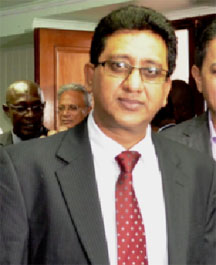The government will be seeking an extension for compliance with recommendations to strengthen the anti-money laundering laws, after the administration’s failure to win the opposition’s support to fast-track the passage of amendments ahead of a review by the Caribbean Financial Action Task Force (CFATF) in Nicaragua beginning next Monday.
Attorney General Anil Nandlall will be heading Guyana’s delegation at the CFATF meeting, where he will be making appeals for an extension to fulfil the stipulated requirements to ensure Guyana’s financial and legislative compliance with international regulations, the Government Information Agency (GINA) reported yesterday.
The Anti-Money Laundering and Countering the Financing of Terrorism (Amendment) Bill, which was tabled on April 22, is currently before a special select committee. Despite government’s appeals for the amendments to be hastily returned to the house for passage, in order to avoid potential sanctions, the main opposition APNU has said that the process would not be rushed, while the AFC has set conditions for its support.
Although President Donald Ramotar this week appealed directly to parliamentarians to pass the amendments by next Tuesday the latest, the select committee examining the bill reconvened on Thursday but will not meet again until June 12.
GINA noted that the committee held four meetings during which the opposition made several requests, all of which were agreed to by the government. It added that the government only asked that the committee meet on a daily basis to complete its work so that the bill’s passage can be expedited. This request was rejected, it, however, noted.
If the extension is granted, the government will still be faced negotiating with the opposition, which possesses one-seat majority in the National Assembly, for the passage of the bill.
GINA said failure to comply with the CFATF recommendations will see Guyana placed on a list of jurisdictions deemed to be “non-cooperating” and “insufficiently compliant,” meaning that member States will be called upon to apply counter measures when dealing with that jurisdiction.
APNU, which had withdrawn from the work of the select committee over the failure of President Ramotar to share a correspondence that CFATF advised be circulated to all stakeholders, including the opposition, has said that the coalition would not be coerced into a speedy consideration of the bill since it wanted to ensure that a proper bill emerged from the process. “It will be brought before the assembly when the select committee has completed its deliberations. We will not be rushed,” APNU leader David Granger has said.
Meanwhile, the AFC has maintained that it would not support the bill unless the president reconsidered his recent veto of two opposition bills and government lists its nominees for the Public Procurement Committee (PPC).
On Thursday, Ramjattan reiterated the party’s position, stating that while the AFC intends to participate in the review of the bill in the special select committee, it would vote no to the bill once returned to the House if its demands were not met.
Although government has been scrambling to force through the amendments by next week, the administration would have been aware of the steps needed to be compliant with international regulations aimed at combating money laundering and the financing of terrorism years ago.
Guyana joined the CFATF in 2002 and had its first Mutual Evaluation Report (MER) in October of 2006 and most of the amendments in amendment bill stem from the recommendations the CFATF would have made in its (MER) on Guyana in July 2011.
Some of the key points made in the July 2011 task force’s MER (the actual on-site visit for the report was made in January 2010) were that there was need for additional staff in the Financial Intelligence Unit (FIU), the Guyana Securities Council, the Division of Cooperative and Friendly Societies (DFSC) and trained financial investigators in the police service and the Customs Anti-Narcotics Unit (CANU).
It was pointed out that while staff of the Director of Public Prosecutions’ Chambers need anti-money laundering training, staff at the police, CANU, Bank of Guyana and the DFSC needed both anti-money laundering and financing of terrorism training.
It was also pointed out that Guyana’s 2009 anti-money laundering Act significantly strengthened the country’s legal framework for combating money laundering but it did not provide sufficient time to assess the effectiveness of the implementation.
It was pointed out that at that time there was only one money-laundering case before the courts and that the FIU only had one staff member and this severely limited its ability on money laundering and terrorism financing investigations.
Guyana had responded to some of the recommendations made pointing out that some of the issues were addressed in other laws outside of the anti-money laundering Act but the task force noted in the report that while the authorities in Guyana had commenced complying with some of the recommendations, the measures were still minimal.





